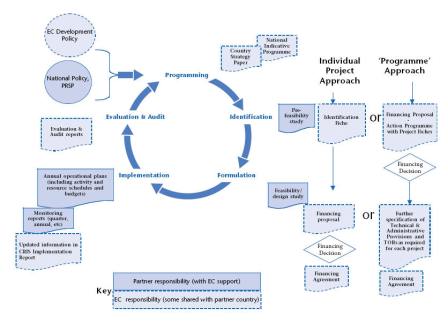
Communication and Impact Oriented Programme Management
Basic Concepts of Programme Cycle management
A "programme" is a collection of projects directed toward a common goal.
This goal represents the meeting ground between the organization's mandate and the needs (including the need to recognise and exercise their rights) of the population where the organization works.
The goal of the programme represents the common overall objective of the various projects (each project also pursues its specific objectives).
The "programme plan" is a document that indicates a broad framework of goals to be achieved, serving as a basis to define and plan specific projects.
Program management is the process of managing multiple inter-dependent projects. It includes co-ordination in designing, implementing and evaluating the projects.
Program Management also reflects the emphasis on co-ordinating and prioritising resources across projects, departments, and entities to ensure that resource allocation is efficiently managed.
Program management provides a layer above project management providing a framework where projects can be run successfully but leaving project management to the project management teams.
Programmes are implemented through projects. In a sense the "projects" can be considered as the "activities" of a programme. The difference is that while the activities of a project are defined when the project is planned, projects are developed later, once the programme was already defined.
See:
Assess the beneficiary needs for programme design and development
Guideline on what to write and how to write a programe;
clarifying the relationship: Responsibilities of Project Managers and programme Managers
Programme manager activities involve:
See also project Definitions- project management - Organization empowerment
Attention: There is an
important difference between project Communication and
organizational
communication
-------
In our organization we have geographical Programme
coordinators who manage district managers who in their turn manage project teams
(generally technical- agriculturists, vets, community organisers, health promoters),
regional admin staff(logistic, admin, IT, HR) and regional advisors (essentially gender,
governance). The regional programme coordinator is supported technically by advisors in
Kabul (livelihoods, community development, M&E, gender, governance). These people have
more experience and higher qualifications. They work along with regional teams to design
programmes, help in achieving outputs within deadlines, etc.
Although our organization has regional managers with sectoral advisors, one can probably
have sectoral heads (like AKDN) with regional managers under each sector (like
one livelihoods programme headed by a livelihoods coordinator and implemetned in
Badakhshan and Bamiyan). I think there might be confuson if both forms of management are
followed together,
---
Flash card Organogram Game
Ask them to write down on flash cards (or post its) the
various job designations that are within the organisation at Bamiyan and at Kabul level.
On seperate flash cards ask them also to write the various functions performed by
these people (advisory, line manager, sector coordination, regional manager, etc.).
Perhaps one job has more than one function.
Through this try and understand what the organogram of the organisation is, what the
communication channels are and what the line manageemnt structure is (straight line
management or what we call dotted line management which means a lateral communication
channel only for support and not for direct management, between the regional programme
staff and Head office in kabul- like between the gender officer in the region and the
gender advisor in Kabul).
The aim: manage the programme cycle in such a way that it:
Resource implications
